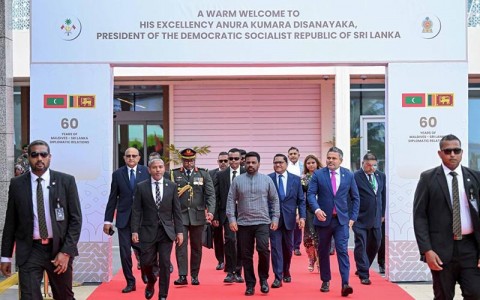
President Anura Kumara Dissanayake arrived at Velana International Airport this morning (28), marking the start of his state visit to the Maldives.
Upon arrival, he was warmly received by Maldivian President Dr Mohamed Muizzu, with a Guard of Honour from the Maldives National Defence Force.
As part of the airport welcome ceremony, a group of young girls performed a vibrant cultural dance, following which President Dissanayake interacted briefly with the performers.
The official ceremony to welcome President Dissanayake is scheduled to take place this afternoon at Republic Square in Malé, under the patronage of President Dr Mohamed Muizzu.
President Dissanayake is accompanied by Minister of Foreign Affairs, Foreign Employment and Tourism, Vijitha Herath, along with a delegation of senior government officials.
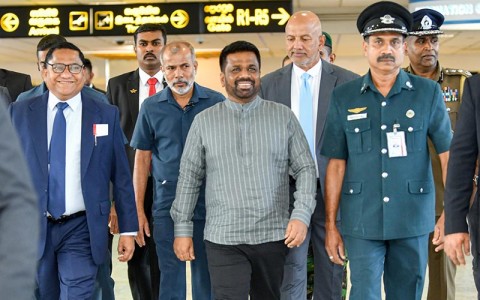
At the invitation of the President of the Maldives, Dr Mohamed Muizzu, President Anura Kumara Dissanayake departed the country this morning (28) for an state visit to the Maldives.
The state visit, scheduled from July 28 to 30, will include bilateral discussions between President Dissanayake and President Muizzu, as well as meetings with other senior Maldivian officials. Several memoranda of understanding are expected to be signed during the visit, aimed at strengthening cooperation between Sri Lanka and the Maldives.
As part of the official programme, President Dissanayake will also address a business forum organised by the Sri Lankan High Commission in the Maldives and engage with members of the Sri Lankan community residing in the Maldives.
The President is accompanied by a delegation including Minister of Foreign Affairs, Foreign Employment and Tourism, Vijitha Herath, along with several senior government officials.
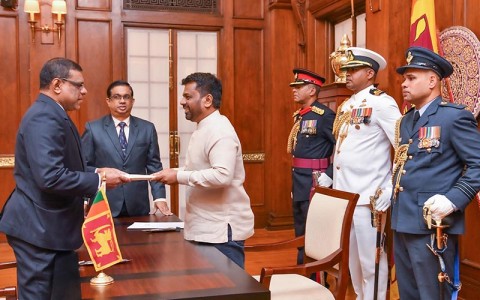
Justice Preethi Padman Surasena, the most senior Supreme Court Justice, was sworn in as the new Chief Justice of Sri Lanka this morning (27) at the Presidential Secretariat, before President Anura Kumara Dissanayake.
Justice Preethi Padman Surasena is the 49th Chief Justice of Sri Lanka.
Justice Surasena’s name was recently approved by the Constitutional Council for the vacancy created by the retirement of former Chief Justice Murdu Nirupa Bidushinie Fernando.
Having been called to the Bar in 1989, Mr. Preethi Padman Surasena subsequently joined the Attorney General’s Department, serving as a State Counsel. He was appointed as a High Court Judge in 2007.
In 2016, he was appointed as a Court of Appeal Judge, becoming the President of the Court of Appeal in 2018, and a Supreme Court Judge in 2019.
Since then, Mr. Preethi Padman Surasena has served as a Supreme Court Judge, making him the most senior Supreme Court Justice after former Chief Justice Murdu Fernando.
Dr. Nandika Sanath Kumanayake, Secretary to the President, was also present at the swearing-in ceremony.
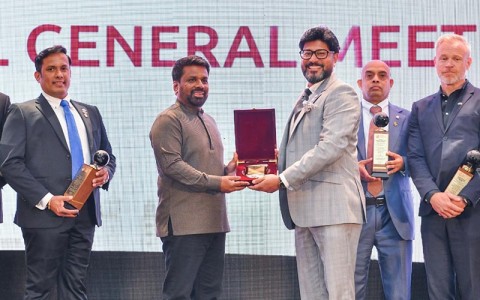
President Anura Kumara Dissanayake attended the inaugural session of the Annual General Meeting of the Global Federation of Sri Lankan Business Councils (GFSLBC), held this morning (25) at the Shangri-La Hotel in Colombo.
The GFSLBC serves as a platform bringing together the global Sri Lankan business community.
Entrepreneurs from 15 countries, including the United States, the United Kingdom, Japan, Australia, Canada and India, are participating in this two-day summit, which takes place today (25) and tomorrow (26) under the theme “Uniting Global Sri Lankan Businesses – Moving Forward.”
This year’s summit will feature discussions focused on expanding global trade relations, attracting new investments and actively channelling the support of Sri Lankan entrepreneurs worldwide into the country’s economy.
The President also presented symbolic appreciation awards to the international council representatives.
Among those who attended the event was the Minister of Foreign Affairs, Foreign Employment and Tourism, Vijitha Herath; ambassadors; and members of the GFSLBC, including its Secretary-General.
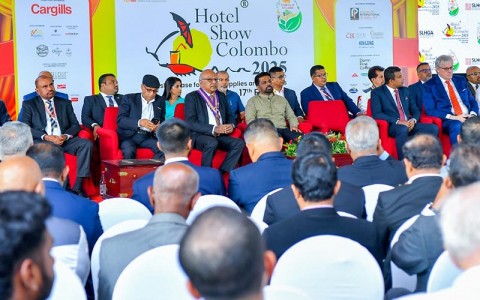
The ‘Hotel Show Colombo – 2025’ was officially inaugurated this morning (25) by President Anura Kumara Dissanayake at the Sirimavo Bandaranaike Memorial Exhibition Centre (BMICH), Colombo.
This exhibition, which is jointly organized annually by the Sri Lanka Hospitality Graduates Association (SLHGA) in collaboration with the public and private sectors, is being held for the 17th time this year.
The Colombo Hotel Show, which began in 1998, is the largest hospitality trade exhibition in Sri Lanka and serves as a valuable opportunity to promote the country’s tourism industry on an international level.
President Anura Kumara Dissanayake, who inaugurated the Hotel Show Colombo – 2025 exhibition, also visited the exhibition stalls and engaged in friendly conversation with the attendees.
Addressing the ceremonial event, Minister of Foreign Affairs, Foreign Employment and Tourism, Mr. Vijitha Herath stated that Sri Lanka’s tourism industry is steadily progressing day by day. Expressing optimism for its future, the Minister noted that the tourism sector is expected to become a key contributor to strengthening the national economy in the coming years.
A large number of people representing the hotel industry, including those involved in hotel supplies and services, as well as the tourism sector, participated in the event. Among those in attendance were Chairman of the Organizing Committee of the ‘Hotel Show Colombo 2025’, Mr. Trevin Gomez and Mr. Patrick Pereira, President of Sri Lanka Hospitality Graduates Association.
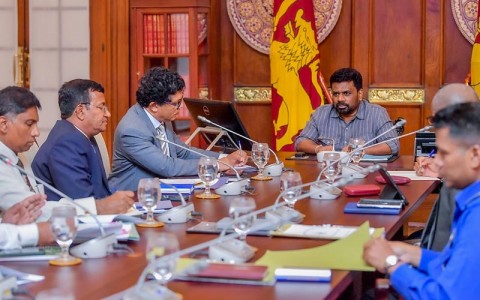
President Anura Kumara Dissanayake held a discussion this afternoon (24) at the Presidential Secretariat with relevant Ministers and Officials regarding the protection of wild elephants and the safeguarding daily lives of rural community.
During the meeting, the President inquired into the current situation regarding the increasing harassment incidents involving wild elephants and their disruptive impact on the daily lives of rural populations.
Officials briefed the President on the prevailing situation and the longstanding difficulties faced by relevant institutions in addressing this issue effectively.
President Dissanayake emphasized that under no circumstances should wild elephants be subjected to harm or harassment and stressed the importance of identifying short-term, medium-term and long-term solutions. The President directed officials to conduct in-depth assessments at the village level and noted that effective solutions need to be provided with the support of both political leadership and the public.
The President instructed the relevant Ministers and Officials to immediately assign 5,000 members of the Civil Security Force as assistants to address the current shortage of human resources.
President Dissanayake further directed that the number of vehicles allocated to officers of the Department of Wildlife be increased, noting that the current shortage hampers their duties. Accordingly, immediate steps are to be taken to procure cabs and motorcycles for this purpose.
In addition, the President called for the prompt preparation and submission of necessary plans for the proposed 800 kilometres of electric fencing and the restoration of 16 elephant corridors, aimed at preventing wild elephants from encroaching into villages.
President Dissanayake also called for an immediate resolution to communication gaps within the Department of Wildlife Conservation and emphasized the need to establish a streamlined system for public access to information and assistance.
Among those present were Minister of Public Security Ananda Wijepala, Minister of Environment, Dhammika Patabendi, Deputy Minister of Environment, Anton Jayakody, Secretary to the Ministry of Environment, K.R. Uduwawala, Acting Inspector General of Police, Priyantha Weerasuriya, Director General of the Department of Civil Security, Major General Palitha Fernando, Director General of the Department of Wildlife, M.S.L.R.P. Marasinghe, Deputy Director (Elephant Conservation) V.L. Thaufeen, DIG of the Environmental Division, Bimshani Jasin Arachchi, Conservator General of Forests, S.C. Palamakumbura, as well as representatives from the security forces and the Department of Forest Conservation.
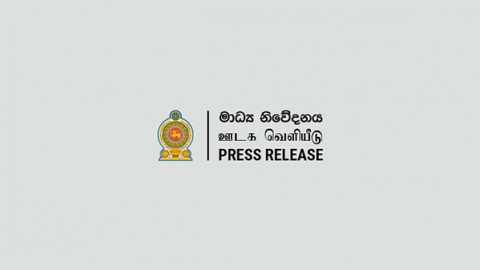
Government takes responsibility for providing optimal school education for every child
– President pledges during debate on Education Reforms
President Anura Kumara Dissanayake stated that the proposed education reform is not merely limited to curriculum revision but will simultaneously elevate both the social and economic spheres of the country.
The President requested support for this initiative, emphasising that it is a social objective, not a political one.
He further stressed that no child should leave school without completing 13 years of compulsory education for any reason whatsoever.
President Anura Kumara Dissanayake made these remarks while participating in today’s (24) parliamentary debate on education reforms.
Following is the full speech delivered by President Anura Kumara Dissanayake;
I intend to present a few points during the debate on education reforms.
No one can be satisfied with the current education system, the young generation it has produced, or the economy it has fostered. Therefore, we urgently need comprehensive education reform.
When discussions about education reform arose, issues such as whether history is included in the curriculum or not became the main topic. However, what is being proposed here is by no means merely a curriculum revision.
Instead, these new education reforms are proposed for a fresh transformation of our entire society, our economic body and our country.
From an economic perspective, our country ranks approximately 38th globally in terms of population density. This means we are a densely populated nation; our population density even exceeds that of China.
Regarding natural resources, we have limited large commercial resources. We lack deposits of oil, gas, gold deposits, iron ore, etc. Therefore, our most valuable asset, the resource that needs to be sharpened and honed to build this nation, is our human capital. Consequently, within our economic strategy, we must focus more on how to advance our nation by developing this human resource.
When we classify those who go abroad for employment, we generally categorise them as domestic workers, unskilled, semi-skilled, skilled, or professional. Looking at professionals, only approximately 3% of our expatriate workforce is engaged in professional occupations. The remaining 97% are in skilled, unskilled, or semi-skilled categories. This shows us that there are two global markets: a goods and services market and a global labour market. We have primarily secured a position in the lower-tier global labour market.
Therefore, from an economic standpoint, we must secure a position in the advanced global labour market. For this, we require a high-quality education system that acquires and disseminates the knowledge emerging in the world at any given moment.
On the social front, our illiteracy and poverty are intertwined. If one is uneducated, they are largely impoverished. If one is impoverished, they are largely uneducated. Therefore, even as a programme to eliminate poverty, education plays a massive role in achieving this. In our villages, it’s commonly said that if one person from a family gets an education, the entire family prospers. Hence, education is extremely crucial for escaping poverty. Furthermore, consider crime in our country. Approximately 80% of those imprisoned have not passed the GCE Ordinary Level examination. Close to 70% of drug addicts have not progressed beyond Year 8.
This indicates a connection between social crime, drug abuse and education. Therefore, if we aspire to a positive transformation of this economic body and this society, then education is the seed, the genesis and the foundation of that transformation. This is why we emphasised the necessity of a broad transformation of education in our policy statement. First and foremost, we must identify the scale of the problems within our education system. Because there’s no point in seeking solutions for problems that don’t exist in the real social fabric. We must seek solutions to the crisis our education is currently facing.
One of the crises we face is our children leaving school prematurely. In 2019, approximately 16,673 children left school, rising to 20,759 in 2022 and 20,755 in 2024. This means they are discontinuing their education while still having further years of schooling available to them. My stance is clear: no child should leave school without completing 13 years of compulsory education.
To elaborate, children born in 2006 would have started school in 2011. In 2011, 358,596 children enrolled in school. These same children would have sat the GCE Ordinary Level examination in 2021. However, only around 311,000 children actually sat the exam. This indicates that nearly 47,000 children had left school. Education reforms are essential to retain these children and ensure they complete their 13 years of compulsory education. Our children must not drop out of school midway; no child should suffer such a fate.
A significant number of factors contribute to children leaving school, including their economic backgrounds, parental conflicts, parents emigrating and unsafe conditions. While developing the education programme, if a child is absent from school for three consecutive days, a state official should conduct a personal investigation into that child’s circumstances. Every child must be retained in school up to 13 years of education. This is included in the proposed programme.
Secondly, discussions in our country often focus on higher education. However, the primary issue we face lies within the school education system. In 2023, there were 98 schools with no new admissions. Furthermore, 115 schools had fewer than 10 students, 406 schools had fewer than 20 students and 752 schools had fewer than 30 students. There were 1,141 schools with fewer than 40 students and 1,506 schools with fewer than 50 students. This means approximately 15% of the entire school system falls into these categories.
Moreover, there are 3,144 schools with fewer than 100 students. This means approximately one-third of all government schools have fewer than 100 students. Is this a healthy situation? In such schools, there are no literary festivals, sports days, excursions, or opportunities for children to interact with their peers. Therefore, we must re-evaluate this school system. We will definitely make that decision.
Some schools need to be closed down, others should be amalgamated and new schools need to be established in certain areas. We must consider relocating schools. Every child should have access to a new society, new experiences and new opportunities. Children should not wither away in the same social conditions, moving only between their village and their school. No child should endure this fate.
Some parents refuse to send their child to the village school and desperately try to send them to a city school. Yet, paradoxically, they also fight to keep the village school functioning. What is the meaning of this? We have had extensive discussions with the Ministry of Education about the necessity of visiting and inspecting schools. We are prepared to meet transport needs. Because even if buildings and human resources are available, if a school only has 10 children, it would be more effective to provide a bus service for those children to travel to a city school.
If we take a closer look at the current challenges within our school system, it becomes evident how significantly human resources are being underutilized. The average teacher-to-student ratio in our country is 1:18. Yet, many districts still face teacher shortages. In schools with fewer than 50 students, the ratio drops drastically to 1:5. For example, a school in Hambantota has just 30 students and 9 teachers this reflects a serious waste of human resources.
In Trincomalee’s Kuchchaveli area, one school has only two students and two teachers. Another school in Haldummulla Education Division, Bandarawela has three students and three teachers, while a separate school in Trincomalee has four students and four teachers. In all these instances, neither the students nor the teachers are achieving meaningful results.
Through our education reform programme, the government is taking responsibility for ensuring that every child receives a high-quality school education. This reform involves rethinking the structure and purpose of our school system, which is a critical undertaking. Every child deserves access to a school equipped with proper facilities, qualified staff and extracurricular activities that enrich the social environment they grow up in. Isn’t that the kind of school we should be striving for?
Our education system has significantly mechanized our children. In many villages today, there isn’t even a volleyball court. After harvesting, children play in the paddy fields or swim in the village tanks. During Vesak, they used to come together to draw pictures and build pandals. But such communal and creative activities have all but disappeared. As a result, we are raising a generation of children who resemble machines, lacking warmth, empathy and a sense of social responsibility.
Sometimes I hear parents say, “Children these days are not like we were.” And they’re right. There ought to be more advanced children at present. Today, tuition starts as early as 4 a.m. They only go to school after finishing extra classes. What kind of life is that for a child? After school, they return to more tuition. Where is their childhood? Do we really want to raise children who don’t enjoy poetry or music? Children who don’t read novels, who grow up without a literary foundation, without social engagement, children who are like machines? A society built on such a foundation cannot move forward.
We must reduce the overwhelming educational burden placed on our children that is our responsibility. Some children are so exhausted that they sleep even after waking up. They sleep in the vehicle and they sleep at school. Don’t we see this? Isn’t it time we changed a system that raises children like robots?
We are now implementing reforms across the entire education system revising subjects, teaching methods and even the volume and weight of the curriculum with the goal of giving children a meaningful and balanced life. Today, the majority of children entering school aspire to become doctors or engineers. But education is not a single, narrow path. It is a wide array of diverse journeys. So what has gone wrong? Our society has placed social value, respect, and professional worth into just two or three fields. Parents believe that for their child to have a good life, they must become a doctor or an engineer. That is simply not true. A society cannot be built on doctors and engineers alone. A healthy, functioning society depends on a broad spectrum of professions. What we need is professionalism across every field. Every profession deserves dignity, value and recognition.
There are many paths in life and our responsibility is to guide children toward professionalism through these diverse avenues. That is the fundamental aim of our education reforms. Every child needs a path to follow. But what has become of that path today? A child cannot truly understand or choose a direction without meaningful dialogue between teachers and parents. Unfortunately, many paths have been reduced to options ranked by perceived social value. For example, a student who doesn’t gain admission to the Faculty of Medicine ends up in the Faculty of Agriculture not by choice, but by default. He becomes an agronomist not out of passion, but because he couldn’t become a doctor. At present, there is a significant disconnect between the Ordinary Level and Advanced Level stages. Our reform process aims to address this.
The new education reform programme will begin gradually starting with Grade 6 in 2026, Grade 7 in 2027, Grade 8 in 2028 and Grade 9 in 2029. That means there are still more than three years before the reforms reach Grade 9. Only when we reach that stage in 2029 will we begin the crucial discussions around helping students identify and pursue the right path for their individual talents, interests and aspirations.
There is a path for a child to become a historian someone who studies the evolution of human civilization. Through that path, we nurture citizens with deep knowledge and understanding of religions and cultures. Isn’t that exactly what society needs? While every child receives a foundational education in subjects like geography, sociology, religion and history, we must go further. We need to foster specialized knowledge that builds upon these basics. For that, a clear, well-structured path must be made available.
In many villages, parents believe that completing the Advanced Level examination marks the end of their child’s education. However, Advanced Level should not be seen as the final stage. Beyond that, we must build a robust national university system and establish advanced vocational training centres that align with the demands of a modern economy. Currently, many vocational training institutions are out-dated some resemble little more than carpentry workshops or small-scale factories. Obviously, children are reluctant to enroll in such environments. A census should be conducted to assess how many students who enter government vocational training centres actually complete their studies. The number would likely be alarmingly low. Many drop out after just three or four months. There remains a stark disparity between the experience of a university student and that of a student in a vocational training centre. This gap must be addressed if we are serious about creating a skilled and future-ready workforce.
Vocational training centres should not be viewed as a fall-back option for those unable to enter university. Our policy is clear: vocational education is not a lesser form of education it is foundational. We aim to establish 40 modern vocational training centres by 2033, integrating both knowledge and technology. Each district will have two such centres, ensuring equal access across the country. Upon completing thirteen years of general education, every child will have the opportunity to enter an open vocational education system. We are committed to ensuring that no child drops out or becomes lost in the education system before completing their thirteen years of schooling.
Traditionally, a child spends thirteen years in school, while a teacher often remains in the system for thirty years. In fact, some of my peers who completed their Advanced Level studies with me are still in the classroom. This raises an important question do our educators possess the updated knowledge and experience required to deliver a modern education? The unfortunate reality is that many do not. Their training and knowledge have not kept pace with the rapidly changing world. How then can we expect to nurture a modern, forward-thinking generation? To achieve this, we must first build a strong, well-equipped generation of teachers. Today, both students and teachers are constrained by an out-dated system. Neither group enjoys true freedom within our current educational framework. This must change.
Therefore, a qualitative transformation in education must occur every five years. To support this, a comprehensive teacher training programme will also be introduced every five years. This on-going
development requires maintaining a surplus of teachers to ensure flexibility and continuity in the system. We will manage our existing teaching workforce accordingly. Subject selection within the curriculum should not be determined by politicians. It must be guided by the recommendations of education experts, in line with the evolving needs of society and global standards. Accordingly, we have entrusted this responsibility to professionals with the necessary expertise in educational reform. The role of political leadership is to establish clear timeframes and ensure the successful implementation of structural reforms. While policy direction and reform timelines fall under political authority, the content and direction of education must remain in the hands of those with academic and pedagogical expertise.
Let us engage in a meaningful discussion on the structural transformations needed in education. We must carefully consider the relevant content, subjects and timelines involved. Since we are not experts in every area, it is essential to unite all segments of society and move forward together on this journey. This education reform process is crucial for the strong and sustainable development of Sri Lanka’s economic foundation. Therefore, all political parties should come together to support and implement these reforms. When introducing this new education system in rural areas, it is important not to align with those opposing progress but to actively support positive change.
While some schools have constructed large buildings and theatres, these developments have not translated into tangible educational benefits. To provide optimal education to every child, fundamental reforms of the education system are necessary. Political influence has penetrated provincial schools more deeply than national schools; sometimes they had used teachers from provincial schools for their political activities. As a result, children have become unintended victims of political agendas. There is a prevailing perception among parents that national schools offer better care and quality than provincial schools this perception must be changed. Constructive dialogue is essential to drive new educational reforms.
Sri Lanka currently faces a critical human resource challenge, as there are no competent teams possessing the necessary skills and there is a shortage of officers who demonstrate professionalism. This has led to the weakening of the state’s institutional structure. Therefore, a strong, skilled workforce is urgently needed. This education reform must be pursued decisively not as a political agenda, but as a social imperative to which everyone must contribute.
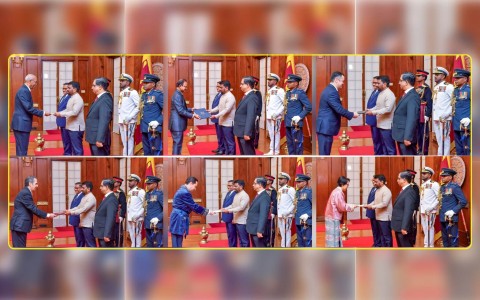
Five newly appointed ambassadors and one high commissioner to Sri Lanka officially presented their credentials to President Anura Kumara Dissanayake at the Presidential Secretariat this morning (24).
Notably, among the diplomats who presented their credentials was Mr. Sergey Viktorov, the newly appointed Ambassador for the Republic of Kazakhstan. This marks a significant milestone in diplomatic relations between Sri Lanka and Kazakhstan, as it is the first time an embassy for Kazakhstan has been established in Sri Lanka. Kazakhstan is also the first Central Asian country to open an embassy in Sri Lanka.
Additionally, new ambassadors have been appointed for the State of Eritrea, the Republic of Uzbekistan, the Hashemite Kingdom of Jordan, and the Kingdom of Bhutan. A new high commissioner has also been appointed for the Republic of Fiji.
The list of ambassadors and the high commissioner who presented their credentials today is as follows:
1. Mr. Alem Woldemariam – Ambassador of the State of Eritrea (Resident in New Delhi)
2. Mr. Jagnnath Sami – High Commissioner of the Republic of Fiji (Resident in New Delhi)
3. Mr. Alisher Tukhtaev – Ambassador of the Republic of Uzbekistan (Resident in Islamabad)
4. Mr. Yousef Mustafa Abdelghani – Ambassador of the Hashemite Kingdom of Jordan (Resident in New Delhi)
5. Mr. Sergey Viktorov – Ambassador of the Republic of Kazakhstan (Resident in Colombo)
6. Ms. Dasho Karma Hamu Dorjee – Ambassador of the Kingdom of Bhutan (Resident in Dhaka)
Mr. Vijitha Herath, Minister of Foreign Affairs, Foreign Employment and Tourism, and Dr. Nandika Sanath Kumanayake, Secretary to the President, were also present at the occasion.
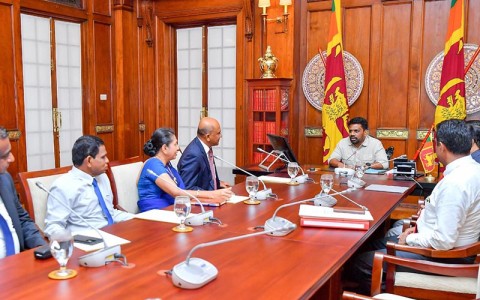
President Anura Kumara Dissanayake has appointed a Special Presidential Investigation Committee to probe alleged incidents of fraud, corruption and irregularities at SriLankan Airlines Limited and Airport and Aviation Services (Sri Lanka) (Private) Limited.
The President met with the members of the Committee yesterday (22) at the Presidential Secretariat and engaged in a discussion with them.
During the meeting, President Anura Kumara Dissanayake emphasized that the absence of a proper investigation into the irregularities at SriLankan Airlines Limited Company and Airport and Aviation Services (Sri Lanka) (Private) Limited has rendered these institutions largely ineffective. The President urged the Committee to carry out a swift investigation by examining all the facts related to these incidents and to provide a report with essential recommendations aimed at correcting the situation and preventing similar occurrences in the future.
The appointment letters for the Convenor of the Committee and its members were handed over yesterday (22) by Secretary to the President, Dr. Nandika Sanath Kumanayake.
Accordingly, the Secretary/Convenor of this Special Presidential Investigation Committee is Mr. K. N. M. Kumarasinghe – Additional Secretary to the President, while the Chairman of this Committee is Retired Auditor General, Mr. H. M. Gamini Wijesinghe and other members are Retired Additional Director General of Customs, Mr. D. Gnanasiri Senanayake, Chairman of the Sri Lanka Savings Bank, Mr. Dushyanta Basnayake, Attorney-at-Law Mr. Don Chaminda J. Athukorala and Additional Director General of the Department of Public Enterprises Mr. N. A. H. K. Wijeratne.
The Committee will investigate alleged offenses committed between 2010 and 2025 within SriLankan Airlines Limited and Airport and Aviation Services (Private) Limited, including:
• Abuse of power and unlawful privileges by the Board of Directors and senior management of SriLankan Airlines
• Irregularities in awarding service contracts and recruitment procedure
• Aviation security lapses
• Discrepancies related to duty-free shop transactions and overseas sales agent’s transactions and activities
• Administrative errors, corruption, irregularities and/or external interference that negatively impacted the efficient operation of SriLankan Airlines
Corruption and irregularities in the procurement and/or leasing or acquisition of aircraft, as well as goods and services exceeding ten million rupees, by SriLankan Airlines during the period from the year 2000 to 2025.
The Committee is also tasked with identifying those accountable for the erroneous decisions, as well as the fraud, corruption and irregularities highlighted in the J. C. Weliamuna Committee Report and the Auditor General’s Special Investigation Report. The committee aims to make recommendations for rectifying these issues and to offer essential guidance to avert similar situations from arising in the future.
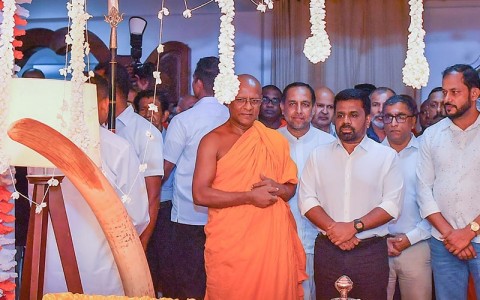
President Anura Kumara Dissanayake paid his final respects to the late Most Ven. Anamaduwa Sri Dhammadassi Anunayake Thero last night (22).
The President visited the Most Venerable Udugama Sri Buddharakkhita Maha Nayaka Thero Memorial Hall of the Asgiri Maha Viharaya, where the remains of the late Anunayake Thero are lying in state. There, the President offered his final respects and extended his heartfelt condolences to the Maha Sangha of the Asgiri Chapter.
Following this, the President met with the Most Venerable Warakagoda Sri Gnanarathana Maha Nayaka Thero of the Asgiri Chapter and engaged in a cordial discussion.


